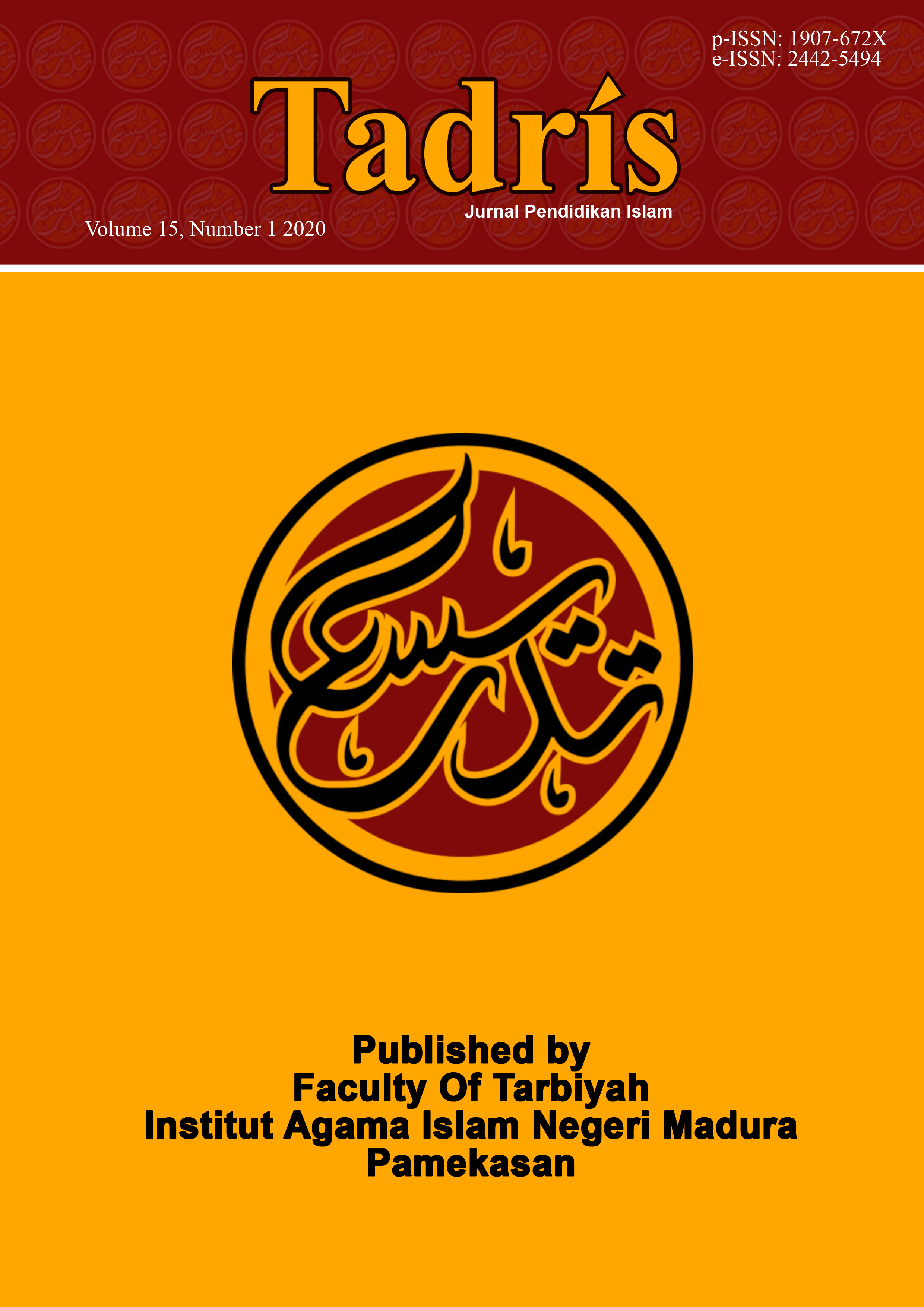Penguatan Pendidikan Karakter di Era Industri 4.0: Optimalisasi Pendidikan Agama Islam di Sekolah
 Abstract views: 790
,
Abstract views: 790
,
 PDF downloads: 656
PDF downloads: 656
Abstract
Advances in information and communication technology in the Digital Revolution Era, in addition to positive impacts, also had a negative impact on human character, such as individualist, materialist attitudes, and even rejecting spiritual aspects. Therefore, we need the concept of Strengthening Character Education by optimizing the role of Islamic Religious Education in Schools to educate students who have faith, taqwa, and have good character according to their fitrah. To answer this need, a library research study was conducted which analyzed several papers that were relevant to the hermeneutic approach and content analysis method. This article finds that the optimization of Islamic Religious Education in Strengthening of Character Education in schools can be done by: first, strengthening the character of Muslim teachers who emulate the character of the Prophet SAW as a true educator; secondly, optimization of Islamic Religious Education in Class-based Strengthening Character Education with a tauhid-based science paradigm, integrating Islamic values in learning, and strengthening Islamic Religious Education materials in schools; third, optimization of Islamic Religious Education in school-based Strengthening Character Education by implementing the concept of taqwa-based Islamic education and making surau as a character labor; and fourth, the optimization of Islamic Religious Education in community-based Strengthening Character Education by organizing Islamic parenting and school collaboration with parents and the community in strengthening the character of students.
Downloads
References
al-Attas, Syed Muhammad Naquib, Konsep Pendidikan dalam Islam, Bandung: Mizan, 1988, cet. ke-3
Hadi, Sutrisno, Metodologi Research, Yokyakarta: Rake Sarasin,tt
Hawwa, Sa’id, Tarbiyatuna ar-Ruhiyah, Penj. Imam Fajaruddin, Surakarta: Era Adicitra Intermedia, 2010
Hamzah, Amir, Etos Kerja Guru Era Industri 4.0, Malang: Literasi Nusantara, 2019
Imaduddin, Muhamad, Membuat Kelas Online Berbasis Android dengan Google Classroom; Terobosan Pembelajaran Era Revolusi Industri 4.0, Yogyakarta: Garuhawaca, 2018
Ismail SM, et. al. (ed.), Paradigma Pendidikan Islam, Yogyakarta: Pustaka Pelajar, 2001
Kosim, Muhammad, Pendidikan Karakter Berbasis Keislaman dan Keindonesiaan, Jurnal al-Taujih, Vol. 6 Nomor 2, Juli - Desember 2017
Kosim, Muhammad, Pendidikan Karakter Islami: Mempertegas Identitas Kader HMI, Handout disampaikan pada LK I HMI Kom. Tarbiyah UIN Imam Bonjol Padang, tanggal 11 April 2018 di Wisma HMI Cabang Padang
Muliawan, Jasa Ungguh, Pendidikan Islam Integratif, Upaya Mengintegrasikan Kembali Dikotomi Ilmu dan Pendidikan Islam, Yogyakarta: Pustaka Pelajar, 2005
Nasir, Mohammad, Materi Menteri Kemristekdikti: Kebijakan Nasional Pendidikan Tinggi Indonesia Menghadapi Revolusi Industri 4.0, Slide Ppt, 2 Februari 2018
Nata, Abuddin, Pendidikan dalam Perspektif Alquran, Jakarta: Kencana, 2016
Pendidikan 4.0, Apa Itu? (https://eduaksi.com/pendidikan-4-0-apa/)
Priatmoko, Sigit, Memperkuat Eksistensi Pendidikan Islam di Era 4.0, Ta’lim: Jurnal Studi Pendidikan Islam, Vol. 1, No. 2 Juli 2018
Purippendolf, Klans, Analisis Isi: Pengantar Teori dan Metodologi, Penj. Farid Wadji, Jakarta: Rajawali, 1991
Ramayulis, Ilmu Pendidikan Islam, Jakarta: Kalam Mulia, 2010
Sardar, Ziauddin, Rekayasa Masa Depan Peradaban Muslim, Penj. Rahma Astuti, Bandung: Mizan, 1986
Sulaiman, Abdul Hamid Abu, Krisis Pemikiran Islam, Penj. Rifyal Ka'bah, Jakarta: Media Dakwah, 1994
Suprayogo, Irman dan Tobroni, Metodologi Penelitian Sosial-Agama, Bandung: PT.Remaja Rosdakarya, 2001
Suyanto, Bagong dan Sutinah, Metode Penelitian Sosial; Berbagai Alternatif Pendekatan, Jakarta: Kencana, 2005, cet I.
Tafsir, Ahmad, Ilmu Pendidikan dalam Perspektif Islam, Bandung: Remaja Rosdakarya, 2008
Wardani, Ratna, 21st Century Educator: Menyongsong Transformasi Pendidikan 4.0, Slide Seminar Nasional Dinamika Informatika Senadi UPY 2018
Yahya, Muhammad, Era Industri 4.0: Tantangan dan Peluang Perkembangan Pendidikan Kejuruan Indonesia, Naskah Pidato Pengukuhan Penerimaan Jabatan Professor Tetap dalam Bidang Ilmu Pendidikan Kejuruan Fakultas Teknik Universitas Negeri Makassar, 14 Maret 2018
Copyright (c) 2020 TADRIS: Jurnal Pendidikan Islam

This work is licensed under a Creative Commons Attribution-NonCommercial 4.0 International License.
The journal operates an Open Access policy under a Creative Commons Non-Commercial 4.0 International license. Authors who publish with this journal agree to the following terms:
- Authors retain copyright and grant the journal right of first publication with the work simultaneously licensed under a
 Commons Attribution-NonCommercial 4.0 International License
Commons Attribution-NonCommercial 4.0 International Licensethat allows others to share — copy and redistribute the material in any medium or format, and adapt — remix, transform, and build upon the material.
- Authors are able to enter into separate, additional contractual arrangements for the non-exclusive distribution of the journal's published version of the work (e.g., post it to an institutional repository or publish it in a book), with an acknowledgement of its initial publication in this journal.
- Authors are permitted and encouraged to post their work online (e.g., in institutional repositories or on their website) prior to and during the submission process, as it can lead to productive exchanges, as well as earlier and greater citation of published work (see The Effect of Open Access).














